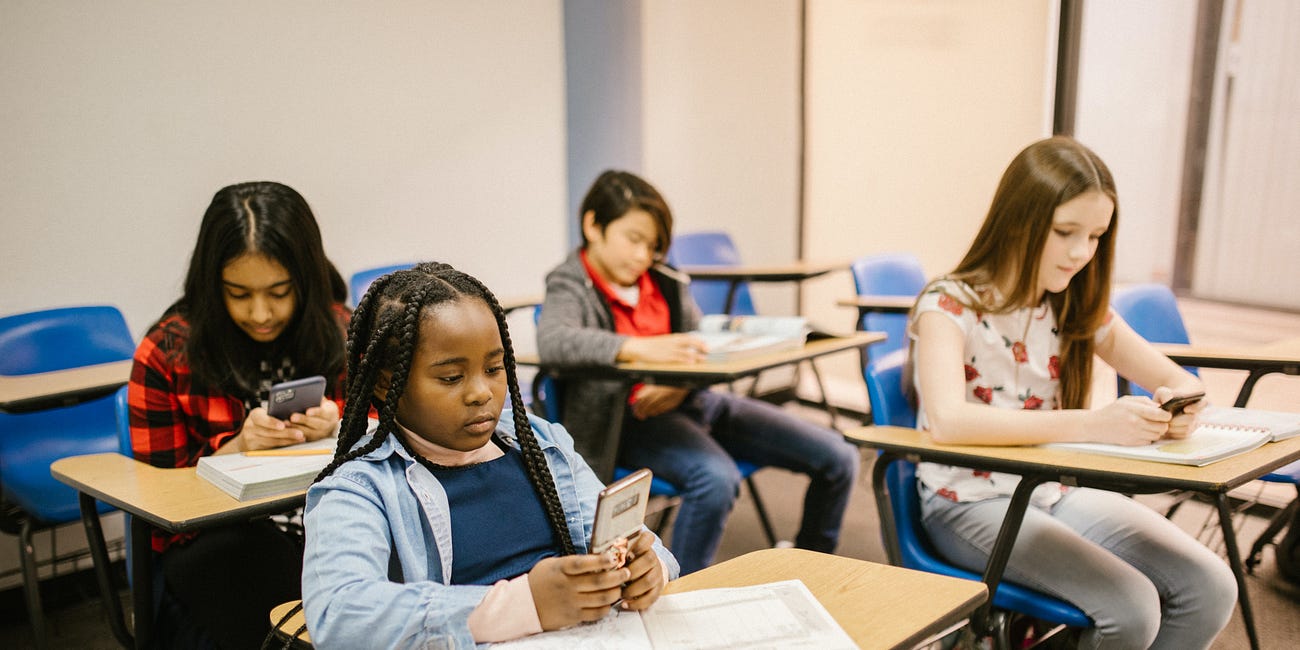Why We Need to Ban Smartphones From School
I spoke at a recent school board meeting in favor of a policy to ban smartphones and smartwatches from the classroom. See my comments and those of others...
Hello Bar-Setters,
Over the past year, there have been some major strides made for those who’d like to keep smartphones out of the classroom. Most notably, starting in 2024, the Netherlands will ban smartphones and smartwatches in the classroom throughout the entire country. I expect more countries will follow.
My school district just passed a similar ban on all smartphones and smartwatches in the classroom. I recently spoke at my local school board meeting in favor of this policy and I will share my statement here today.
In Defense of Banning Smartphones From the Classroom
Good evening and thank you for the opportunity to speak. My name is Shane Trotter and I’m here today to speak in support of the new phone policy.
There is only one problem with this policy, as far as I can see and that is that it should not have taken this long to come about. School districts across the country have been slow to fully appreciate the social revolution that has taken hold of our society. We’ve been slow to realize that test scores were falling prior to Covid-19 and that our unprecedented mental health epidemic began nearly a decade prior to Covid-19.
Since 2010, there has been an over 150% increase in major teen depression, there has been over a 120% increase in suicides among adolescents between 10 and 14, the number of students claiming to be lonely while at school has more than tripled, and the average time teens spend with friends has decreased from over 130 minutes per day to less than 50.

Step into our schools and the real culprit is obvious.
In the current school environment, our students walk through the halls staring at their phones, they come into class staring at their phones, and they are constantly sneaking peeks at their phone throughout instruction—scanning their phone intermittently as they work, and rushing through assignments so that they can get back to their phones as quickly as possible.
Students expect to be on their phones for hours throughout the school day. When they are asked to put their phone away, many respond with a clear sense of indignation. And nearly all these students will resume trying to use their phone once they think the teacher’s attention is elsewhere.
But I’m not here to blame the students. Adolescents are at a developmental stage where they are most susceptible to their phone’s brain-hacking and they’ve been allowed to believe that their behaviors are normal and acceptable. They’ve been handed an impossibly addictive technology designed by the world’s most brilliant minds to keep us scrolling and checking each app as much as possible.
Rather than help students adapt to this revolutionary temptation, our school environment has only made matters worse. We’ve created an environment where students expect to be on their phones all day. We’ve maintained an environment where students feel a very real pressure to constantly engage with chat groups, social media, and online games. Students' minds are always pulled away— always processing the last message they received. Thinking through their next clever response. Anticipating another response. Worrying about social media comments. Worrying about whether they’re posts are receiving likes. Or, for boys especially, they are always clamoring to get back to group online games.
Even when students aren’t on their phones, they are distracted by the knowledge that, at all times, many of their friends will be actively engaged in smartphone-based activities.
As teachers quickly found out in those first years of our iPad initiative, there is no black list that can stop this. Students will always find alternate apps and clever tricks to work around the firewalls we throw up. Our current policies create a constant psychic toll that makes it nearly impossible for students to focus deeply.
The only way to do our duty and create an appropriate learning environment is to eliminate access to these disruptive devices. The smartphone policy that is up for consideration finally does this. It finally offers the sort of wise adaptation that we must begin to make on behalf of our future generations.
For a more in depth argument against phones in school, I recommend these articles:
An Open Letter to Parents Who Oppose Cell Phone Bans (and the schools who listen to them)
Hello good people! On the agenda today is: a story of one North Texas school district (to set the scene), an open letter to parents who oppose school cell phone bans and a final plea to combat what I’ve called Temper Tantrum Tyranny. Let’s jump in.
In addition to these, I’ve written many other posts about the smartphone problem, here, and compiled many resources to help parents navigate this issue.
Thank you for reading today and for sharing with anyone you think would find this valuable.
Carry the fire!
Shane




